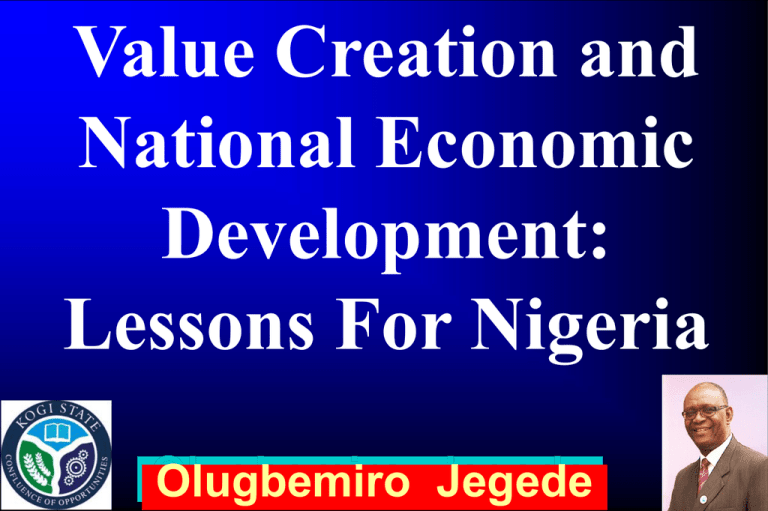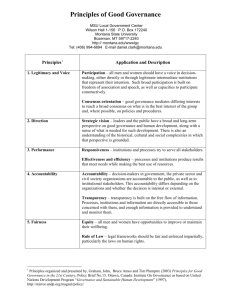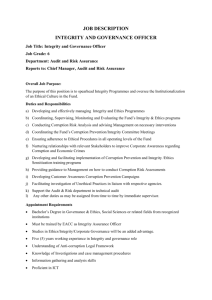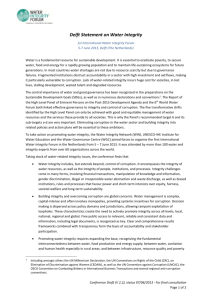Value creation and national economic development
advertisement

Value Creation and National Economic Development: Lessons For Nigeria Olugbemiro Jegede Pleased to be Here Thank ANAN for the invitation as Guest Speaker Not sure am the right person for the task My involvement with the topic is rudimentary and limited Gave a Keynote to the 2nd Conference of the African Accounting & Finance Association on 5th Sept 2012 Paper is only to set the tone 2 Ahmadu Bello University University of Southern Queensland University of Abuja Collateral Learning and the EcoCultural Paradigm in Science and Mathematics Education in Africa Olugbemiro Jegede Curtin University of Technology, Australia Open University of Hong Kong Focus Introduction Values, Value Creation Five Parts of Every Business Economically Viable Skills and Economic Values Corporate Governance in Public Sector Value Creation and The Constitution Way Forward 4 Values Different meanings to different people Simply put, values refer to the usefulness or importance of an issue, idea, product or situation. A very comprehensive definition sees values as important and lasting beliefs or ideals shared by the members of a culture about what is good or bad and desirable or undesirable. Values have major influence on a person's behaviour, choice and attitude and serve as broad guidelines and guide decisions in all situations. 5 Value Creation Value creation is the performance of actions that increase the worth of goods, services or even a business. Many business operators now focus on value creation both in the context of creating better value for customers purchasing its products and services, as well as for shareholders in the business who want to see their stake appreciate in value. According to The Economist, ‘value creation is a corporation's raison d'être, the ultimate measure by which it is judged’. It is common knowledge that value creation is the bedrock of any business. 6 Process of Value Creation Value is created through an organization’s business model, which takes inputs from the capitals and transforms them through business activities and interactions to produce outputs and outcomes that, over the short, medium and long term, create or destroy value for the organization, its stakeholders, society and the environment’. ‘A successful business is either loved or needed’ (Ted Leonsis, former Executive of AOL) 7 5 Parts of Every Business Laying a foundation using Business Principles 101 for later parts of our conversation As it is normally defined in management of business textbooks, a business is a repeatable process that: Creates and delivers something of value... That other people want or need... At a price they’re willing to pay... In a way that satisfies the customer’s needs and expectations... So that the business brings in sufficient profit to make it worthwhile for the owners to continue operation. Most businesses that succeed do so through innovation. 8 Value Creation Funnel All valuecreating innovation regardless of what type of business or service must go through three stages of Value Creation Funnel 9 Interdependent Processes of an Excellent Business Plan ValueCreation Discovering what people need, want, or could be encouraged to want, then creating it. Marketing Attracting attention and building demand for what you’ve created. Turning prospective customers into paying customers by completing a transaction. Giving your customers what you’ve promised and ensuring they’re satisfied with the transaction. Sales ValueDelivery Finance Bringing in enough money to keep going and make your effort worthwhile. 10 No Business:Any One minus 5 A venture that doesn’t create value for others is a hobby. A venture that doesn’t attract attention is a flop. A venture that doesn’t sell the value it creates is a non-profit. A venture that doesn’t deliver what it promises is a scam. A venture that doesn’t bring in enough money to keep operating will inevitably close. 11 Economically Viable Skills Economically Valuable Skills are skills that are directly related to the 5 Parts of Every Business briefly discussed above. Note that not every skill or area or knowledge is economically valuable. Some skills are primarily valuable for enjoyment or personal interest, but won’t help you improve your business. In order to increase your value in the market, focus on improving skills that are economically valuable. 12 Economic Values 9 common Economic Values that people consider when evaluating a potential purchase. Whenever a customer wants to buy your product, s/he is declaring that they value your product or service more than anything else his/her money could buy at that time. Cost — how much do I have to give up to get this? convenience Speed — how quickly does it work? convenience Reliability — can I depend on it to do what I want? convenience Ease of Use — how much effort does it require? convenience Flexibility — how many things does it do? convenience Status — how does this affect the way others perceive me? fidelity Aesthetic Appeal — how attractive or otherwise aesthetically pleasing is it? fidelity Emotion — how does it make me feel? fidelity Efficacy — how well does it work? fidelity 13 Corporate Governance in Public Sector Corporate Governance in Public Sector Until very recently, people have always argued that the corporate world is quite different from the public sector and hence they should not intermingle. The only way some interaction is seen as valid is when the public sector employee purchases for use the products or services that are outputs of the excellent processes and procedures of value creation in the corporate world. A number of factors has worked together to force the public sector to be interested in the use of those activities and events which guarantee efficiency, innovativeness and creativity 15 Some of these factors include: Interconnections between corporate activity, society and the environment Create an entrepreneurial venture Globalisation. Accountability within the public sector Demand for transparency, placing everyone under scrutiny like never before. The boundaries of social responsibility are rapidly expanding In light of the global financial crisis, much commentary in corporate governance is being directed towards corporate governance in the public sector organizations Understanding choices of Government Ministries, Departments and Agencies (MDA). 16 Corporate Governance in Public Sector Promotes Accountability – being answerable for decisions and having meaningful mechanisms in place to ensure adherence to all applicable laws, regulations and standards. Transparency / openness – having clear roles, responsibilities and procedures for making decisions and exercising power, and act with integrity. Stewardship – enhancing the value of entrusted public assets. Efficiency – applying the best use of resources to further the aims of the organization. Leadership – promoting an entity-wide commitment to good governance starting from the top. 17 Advantages of Using CG in PSG Allows the transfer of the established template for transparency and accountability. Stewardship and accountability for the use of funds and assets is particularly important in the public sector. Growth is positively related not only to the size of the investment but also to the efficiency and transparency of its allocation. Ensures that directors and managers of public enterprises carry out their duties within a framework of accountability and transparency. 18 Value Creation and Economic Development Value Creation and The Constitution1 Section 15 which talks about the Political objectives of Nigeria. It says that 15 (1) The motto of the Federal Republic of Nigeria shall be Unity and faith, Peace and Progress. (2) Accordingly, national integration shall be actively encouraged, whilst discrimination on the grounds of place of origin, sex, religion, status, ethnic or linguistic association or ties shall be prohibited. (3) For the purpose of promoting national integration, it shall be the duty of the State to – 20 Value Creation and The Constitution2 (3) For the purpose of promoting national integration, it shall be the duty of the State to – (a) provide adequate facilities for and encourage free mobility of people, goods and services throughout the Federation; (b) secure full residence rights for every citizen in all parts of the Federation; (c) encourage inter-marriage among persons from different places of origin, or of different religious, ethnic or linguistic association or ties; and …… (5) The State shall abolish all corrupt practices and abuse of power. 21 Value Creation and The Constitution3 Section 16 is concerned with the economic objectives of Nigeria. It states that, (1) The State shall Harness the resources of the nation and promote national prosperity and an efficient, a dynamic and self-reliant economy every citizen on the basis of social justice and equality of status and opportunity; Control the national economy in such a manner as to secure the maximum welfare, freedom and happiness of every citizen on the basis of social justice and equality of status and opportunity;…… 22 Value Creation and The Constitution4 (2) The State shall direct its policy towards ensuring – (a) the promotion of a planned and balanced economic development; (b) that the material resources of the nation are harnessed and distributed as best as possible to serve he common good; (c) that the economic system is not operated in such a manner as to permit the concentration of wealth or the means of production and exchange in the hands of few individuals or a group; and that suitable and adequate shelter, suitable and adequate food, reasonable national minimum living wage, old age care and pensions, and unemployment, sick benefits and welfare of the disabled are provided for all citizens.’ 23 Constitution is Silent Nothing done to constitutionally declare that the nation would from now on use the value creation strategies of the business world to enhance national economic development. No single line or paragraph of the Constitution or any related document it can refer to, that attempts to relate value creation with national economic development. Yet our economy has been said to have over taken that of South Africa and we are now number one in Africa. As if that is not enough exposure to our self-deception, some have declared us as the 20th best economy in the world. Corporate governance within public sector firms has recently begun to receive increased attention. This is particularly the case when countries are attempting to curb widespread corruption within the public sector, or when they are preparing public enterprises for privatization 24 Way forward for Nigeria Issues to Be Reviewed For Nigeria to claim any iota of success in integrating corporate governance in its public sector with especial attention to value creation a number of issues must be reviewed as a matter of urgency. Given the time at our disposal, let me mention just four of them. 26 Sustainability Culture Developing a culture of sustainability underlines the importance of balancing economic efficiency, social equity, and environmental accountability. The concepts of democracy and sustainability are ‘both absolutely indispensable, and further that one cannot be realized without the other’. To make excellent progress in our race to institutionalise corporate governance in our public sector matters, we must examine the way to incorporate sustainable value. 27 Sustainable Value Creation 28 Emergence of SDG The emergence of the Sustainable Development Goals (SDGs) agreed upon by member states at the United Nations Conference on Sustainable Development, which held from 20-22 June, 2012 in Rio de Janeiro, Brazil (popularly known as Rio+20) replaces MDGs It was decided in the Rio+20 document, The Future We Want, to establish an "inclusive and transparent intergovernmental process open to all stakeholders, with a view to developing global sustainable development 29 goals to be agreed by the General Assembly". Common Africa Position (CAP) The Common African Position has as its pillars the follow: Structural economic transformation and inclusive growth Science, technology and innovation People-centred development Environmental sustainability, natural resources management and disaster risk management Peace and security Finance and partnerships 30 Education and Value Creation What Vision? “Where there is no vision, the people perish..” Prov 29:18 Hence we are in trouble with Governance and education Must do something drastic to avoid disaster ….and so we are off to the optometrist for a quick fix …. Goals of the st C21 sustainable development highly educated, mobile and adaptable workforce multi-skilled and multi-tasked a knowledge and a learning society use of ecological and geographical conditions to a nation’s advantage In the Beginning… Things Fell Apart Govts, especially the military detested academic freedom, university autonomy, demonstrations. Brutal clamp down on campus riots. Military raped and killed students in Zaire (1992), Burkina Faso (1987) Niger (1989) Cote D’Ivoire (1992) Kenya (1992), Nigeria (1973). Damaging effects of the 1988 World Bank report on the Education in Sub-Saharan Africa. Jomtien WCE for All (1990) and Dakar WEF (2000) on Basic education. Civil wars – Liberia, Ethiopia, Somalia, Eriteria, Rwanda, Burundi, Namibia, South Africa and Nigeria Effects on Higher Education Establishment of universities stopped abruptly. Sharp diminishing financial resources. Physical, managerial and intellectual dilapidation. No more production of human resources to develop Africa. Flight of the best brains to safe and greener pastures. Effects on Higher Education2 Dwindling provision of funds to HE Uncontrolled proliferation of for-profit universities Huge unmet demand in HE Obsolete curricula Inability to meet the skills demanded by the private sector Inability to address balance between enrolment and quality of education Uncertainty about what HE means to Africa in the 21st C State of Education in Africa The continent is heavily threatened by economic strangulation; political instability; conflicts and terrorism; fragility of some of our nations; endemic corruption; geopolitical imbalances and hatred; huge capacity development needs; extreme poverty; a preponderance of unemployed, underemployed and unemployable youths. The data available indicate that as at January 2015: over 10 million seek employment annually and that 60 per cent of the unemployed are youths. at least half of the 1 billion people are still illiterate. Africa has the world’s highest illiteracy rates. Sub-Saharan Africa is home to at least 30 per cent of the world’s poorest people. 39 Surviving the st 21 Century Sub- Saharan Africa must engage in: Building of very strong economic foundation; Economic integration regionally and continently; Massive job creation; Embarking on effective food security measures; Health and environmental provisions; Innovations and creativity buoyed by education; Energy reforms and directing attention to combating climate change; and Massive investment in education, especially tertiary 40 education. The Africa We Want 2063 There should be ‘created an Africa of our dreams that is prosperous, healthy, vigorous, creative and exciting’ (Versi, 2015). To achieve this, as has been done in other parts of the world, Africa must re-focus on using education as the fundamental and virile instrument for continental, regional and national development. 41 Value Creation and Human Capital Development 42 One Too Many! Bastardisation of education, especially higher education Entrenching Corruption as a fixed member of the Board 43 Addressing the Mismatch Capitalised on knowledge economy as power of the future Abolished tenure system: no permanent seat or office for life Encouraged job change for personal development and to broaden career choices and being futuristic Work force becoming multi-skilled and multi-tasked Became a learning society as response to change from Industrial to post-industrial 44 Challenges of African Academics To strive to raise our game in and out of the lecture hall to assist HE in Africa achieve excellence again. Participate in the war against illiteracy on the continent Enlist in the fight against corruption in our continent especially in the universities Strive to be multi-tasked and multiskilled - be a great academic and an excellent Accountants 45 Education Bastardised Education is the best legacy to bequeath to younger generations. We play politics with education No concerted effort to completely redraft from scratch our national policies on education Using 19th century tools to solve 21st century issues and concerns in nation building. youth driven into the hands of ‘militancy’ and ‘Boko Haramism’ – two perfect examples of a rudderless nation ridden with bad governance, lack of incisive accountability and breading illiteracy and lawlessness faster than the rate 46 maggots reproduce. Africa’s Answer to HE Reform Effective implementation of the 2nd Decade of Education in Africa (2006-2015) Encourage greater mobility of academic researchers, staff and students Establish an African HE and Research Space: quality Assurance, harmonisation of academic programmes and recognition of qualifications Use ICT effectively and appropriately to develop, produce, acquire and distribute knowledge, skills and competencies Collaboration and partnership on equal and mutually beneficial platforms Creating centres of excellence Eradicating Corruption Transparency International That Nigeria is one of the most corrupt countries in the world is no more news. But that we seem to think that it has become part of our national and individual dressing code is what is most disturbing. The latest global corruption index from Transparency International says that for 2014, Nigeria is up eight places to 136 out of 175 countries ranked by the index. As reported by Olaniyan, author of ‘Corruption and Human Rights Law in Africa’, and who is Legal Adviser, International Secretariat of Amnesty International, London, Nigeria shares 136th position with well-known corrupt countries like Cameroon, Kyrgyzstan, Iran, and Lebanon. 49 All Have Sinned No country is entirely free of corruption. But if corruption is deep enough it can hinder economic growth and good governance, and decay the fabric of society. Corruption is an obstacle to sustainable development, with the potential to enlarge economic gaps and breed organized crime. Unchecked corruption leaves little room for democracy to flourish; little room for freedom to expand; little room for justice to prevail.” Adamu on Corruption “But in reality, corruption is so pervasive in Nigeria today that there is nothing and no area that has remained unaffected by it. To short change the nation, soldiers have colluded with technocrats; and civilians have colluded with bureaucrats; and businessmen have colluded with all of them. But the real tragedy of Nigeria is that everything is just so awfully wrong with every single issue in every place about everything without exception all over the country. It is as if corruption is the norm, accepted, encouraged and institutionalised. Daily Trust, Sept 10, 2010 Score card for Nigeria What Africa needs is not more strong men, it needs more strong democratic institutions that will stand the test of time. Without good governance, no amount of oil or no amount of aid, no amount of effort can guarantee Nigeria’s success. But with good governance, nothing can stop 52 Reviewing the Constitution Obsolete Constitution I have in a section ‘Corporate Governance, Value Creation and The Constitution of the Federal Republic of Nigeria’ discussed how our Constitution does not match the need of an emerging nation willing to use the corporate governance model of value generation to run its public sector. What the examination of the Constitution tells me is that our Constitution is obsolete and does not really fit in with current needs of the nation let alone being reflective of developments in the global scene. Alignthe Constitution with the dictates of value creation in corporate governance. It is only by doing this that we would align the nation with what the 21st century national economic development requires. 54 Conclusion Needed: Accounting manuals for Road Side Trading 56 Needed in Africa A progressive accounting education that lives on knowledge economy Accountants who enforce national and continental regulatory frameworks including professional ethics Accountants who frown at and expose fraud and corruptive tendencies in universities Multi-skilled and multi-tasked accountants who subscribe to advancing their careers through research and other studies Knowledge is the Word! Social thinkers from Confucius through Buddha, Plato, Castro and Castells all allocate a special place in their theories of development to knowledge. Manual Castells: “knowledge and networks” Africa cannot leave out the contributions of accounting education in HE Our rescue will be knowledge-intensive development directed at capacity building with cutting edge training and skills acquisition. 59





